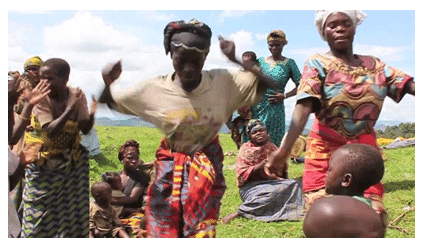 | Embwa tekumoka ekaruma. (Chiga) Mbwa hawezi kupiga kelele na kuuma wakati mmoja. (Swahili) Un chien ne peut pas aboyer et mordre dans le même temps. (French) A dog cannot bark and bite at the same time. (English) |
Chiga (Rwanda and Uganda) Proverb
Introduction
A special feature of this website is to circulate worldwide an “African Proverb of the Month.” Our plan to is post an important proverb from a different African country every month. We use a simple format that includes: first, meaning and use of the proverb; second, biblical parallel; and third, application of the proverb. African proverbs of previous months are found under “Resources” starting with the June, 1998 “African Proverb of the Month.” You are invited to send an African Proverb to the moderator@afriprov.org to be posted on this website. We hope this can be a participatory website. Welcome.
 | Embwa tekumoka ekaruma. (Chiga) Mbwa hawezi kupiga kelele na kuuma wakati mmoja. (Swahili) Un chien ne peut pas aboyer et mordre dans le même temps. (French) A dog cannot bark and bite at the same time. (English) |
Chiga (Rwanda and Uganda) Proverb
 | Emuana uritanga, encano, w’arisa mu yakusianga mo’i kimua. (Nyanga) Mtoto anakula kwa wazazi wake hata kama alimwaga unga. (Swahili) L’enfant mange chez se parents meme s’il a verse la farine. (French) A child eats at his/her parents even if he/she has poured out the flour. (English) |
Nyanga (Northern Kivu Province Walikale Territory, DRC) Proverb
 | Emam itwaan emamakar epei. (Turkana) Hakuna mtu anaweza kuishi pekee yake kama kisiwa. (Swahili) Personne peut vivre seule comme ile. (French) No person is an island. (English) |
Turkana (Kenya) Proverb
 | Mughenyi ni kukaahu ni njeu. (Nyaturu) Mgeni ni kuku mweupe. (Swahili) L’étranger, c’est une poule blanche. (French) The stranger is a white chicken. (English) |
Nyaturu (Tanzania) Proverb
 | Baaya munga si bataaya muati. (Tembo) Mara nyingi huona mkwe vibaya si binti. (Swahili) Souvent celui qui voit le beau-fils mal n’est pas la fille. (French) The person who sees the in-laws to be bad is not the engaged woman. (English) |
Tembo (DRC) Proverb
 | Mayo wa myao nawe mmayoho. (Digo) Mamako mwenzio ni mamako pia. (Swahili) La mere de ton ami est ta mere aussi. (French) Your friend’s mother is your mother too. (English) |
Digo (Mijikenda) Kenya Proverb
 | Akavia kakhuanyisivyanga mumasika. (Nyala) Mazishi hutoa nafasi ya Upatanisho. (Kiswahili) Le deuil est une occasion de réconciliation. (French) A funeral offers the opportunity for reconciliation. (English) |
Nyala (Kenya) Proverb
 | Musili nokage mungobi nokage muloli wa moso. (Holoholo) Mpiga ngoma na mwimbaji ndo wanafaida ila musikilizaji hana faida. (Swahili) Le tambourin et le chanteur sont les plus importants et non ceux qui suivent la musique. (French) A drummer and a singer are the beneficiary not the listener. (English) |
 | Kekur lala olgejep. (Samburu) Watu wa jamii moja hawafichani mambo na hujadiliana juu ya lolote. (Swahili) Les membres de meme famille sont ouvert, l’un a l’autre et peuvent discuter n’importe quoi. (French) Members of the same family are open to each other and can discuss anything. (English) |
Samburu (Kenya) Proverb